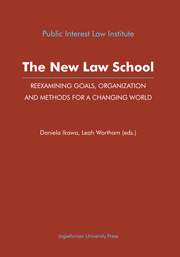Preface
Published online by Cambridge University Press: 05 September 2014
Summary
Although there have been a number of initiatives to reform legal education in Central and Eastern Europe over the past two decades, there is a dearth of literature on the subject coming from the region itself. This publication attempts to help fill that void.
The book is the product of a conference on “The Need for a New Law School,” which was organized by the Public Interest Law Institute (PILI) and the Center for Foreign Law Programs of the Jagiellonian University Faculty of Law, in Cracow, Poland, June 19–21, 2008.
There have been many dozens of conferences held in Central and Eastern Europe on particular aspects of legal education, on topics such as interactive teaching methods or innovative curricular additions like university-based legal aid clinics. There has been precious little attention paid, however, to the underlying constraints preventing law faculties in the region from transforming the educational experience for their students to the same degree as the legal systems that the law faculties profess to study and elucidate have, themselves, been transformed.
The push and pull of change and constraint have been experienced in Central and Eastern Europe at the same time that Europe as a whole has been engaged in an effort – dubbed the “Bologna process” after a declaration of intent signed in 1999 by twenty-nine European countries in Bologna, Italy – to transform European higher education.
- Type
- Chapter
- Information
- The New Law SchoolReexamining Goals, Organization and Methods for a Changing World, pp. 7 - 8Publisher: Jagiellonian University PressPrint publication year: 2010

